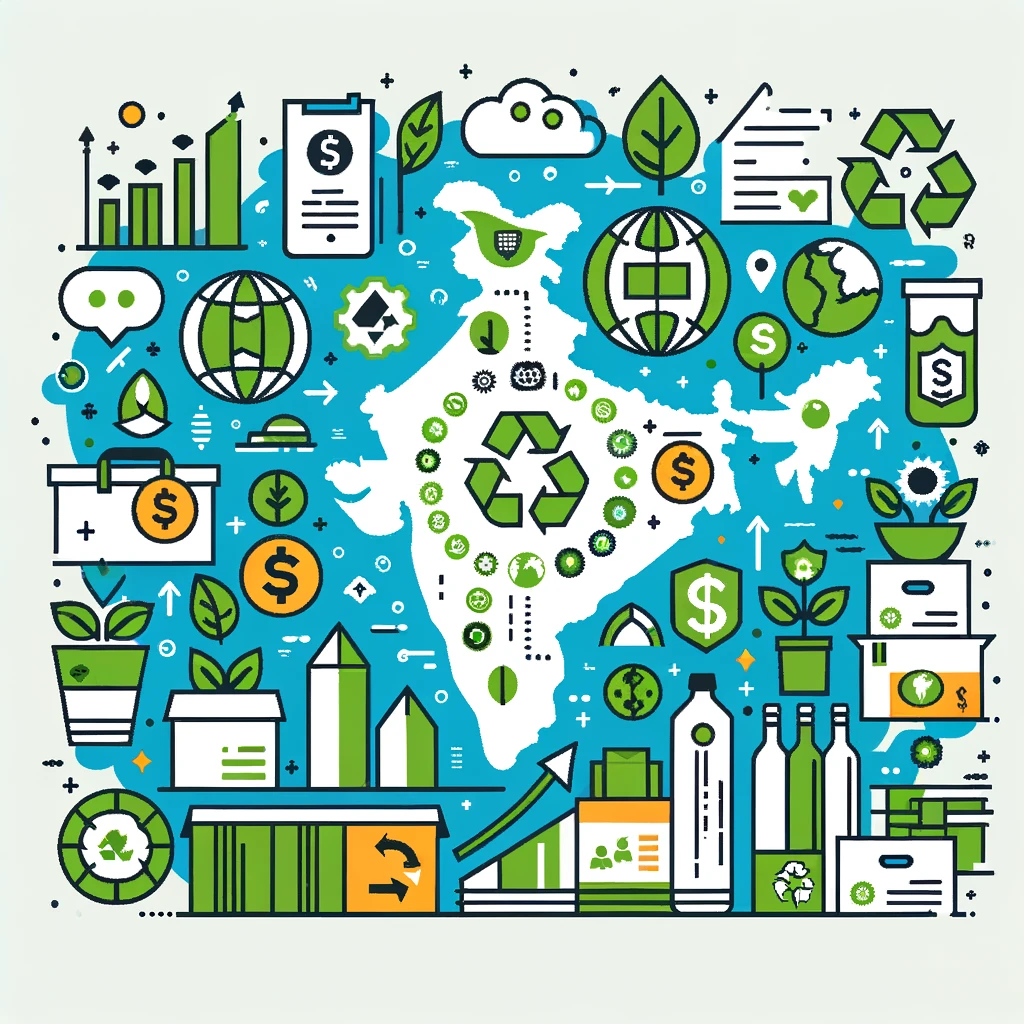
Why is the Indian Sustainable Packaging Market an Attractive Destination for International investment ?
- Growing Market Size: The Indian packaging industry is one of the fastest-growing sectors, driven by increasing consumer demand, urbanization, and e-commerce growth. The sustainable packaging segment within the industry is witnessing significant growth due to rising environmental awareness and regulatory initiatives promoting eco-friendly packaging solutions.
- Government Initiatives: The Indian government has implemented various policies and initiatives to promote sustainable packaging practices. For example, the Plastic Waste Management Rules 2016 mandate the use of compostable plastics and encourage the adoption of recyclable materials in packaging. Additionally, initiatives such as the Swachh Bharat Abhiyan (Clean India Mission) emphasize waste management and environmental sustainability, creating a favorable regulatory environment for sustainable packaging investments.
- Consumer Awareness and Demand: There is a growing awareness among Indian consumers regarding environmental issues and the need for sustainable products, including packaging. As consumers become more conscious of their environmental footprint, there is an increasing demand for eco-friendly and recyclable packaging solutions in various industries such as food and beverage, healthcare, and personal care.
- Innovative Technologies: Indian companies are investing in research and development of innovative sustainable packaging technologies. This includes the development of biodegradable plastics, compostable packaging materials, and alternative packaging solutions using renewable resources such as bamboo, sugarcane bagasse, and bioplastics. These innovations offer opportunities for international investors to collaborate with Indian companies and leverage their expertise in sustainable packaging.
- Market Potential: The Indian sustainable packaging market is projected to grow significantly in the coming years. According to market research reports, the Indian sustainable packaging market was valued at USD 3.5 billion in 2020 and is expected to reach USD 11.1 billion by 2025, exhibiting a compound annual growth rate (CAGR) of 26.7%. This substantial market potential makes India an attractive destination for international investment in sustainable packaging solutions.
- Supply Chain Opportunities: India offers opportunities for international investors to establish manufacturing facilities and supply chain networks for sustainable packaging materials and products. With a large pool of skilled labor and a growing network of packaging suppliers, India provides a competitive advantage for investors looking to expand their presence in the sustainable packaging market.
- Partnership Opportunities: International investors can collaborate with Indian companies, startups, and research institutions to develop and commercialize sustainable packaging solutions. Joint ventures, technology transfers, and strategic partnerships can facilitate knowledge exchange and accelerate the adoption of innovative sustainable packaging technologies in the Indian market.
KEY INDIAN PLAYERS IN INDIAN SUSTAINABLE PACKAGING MARKET
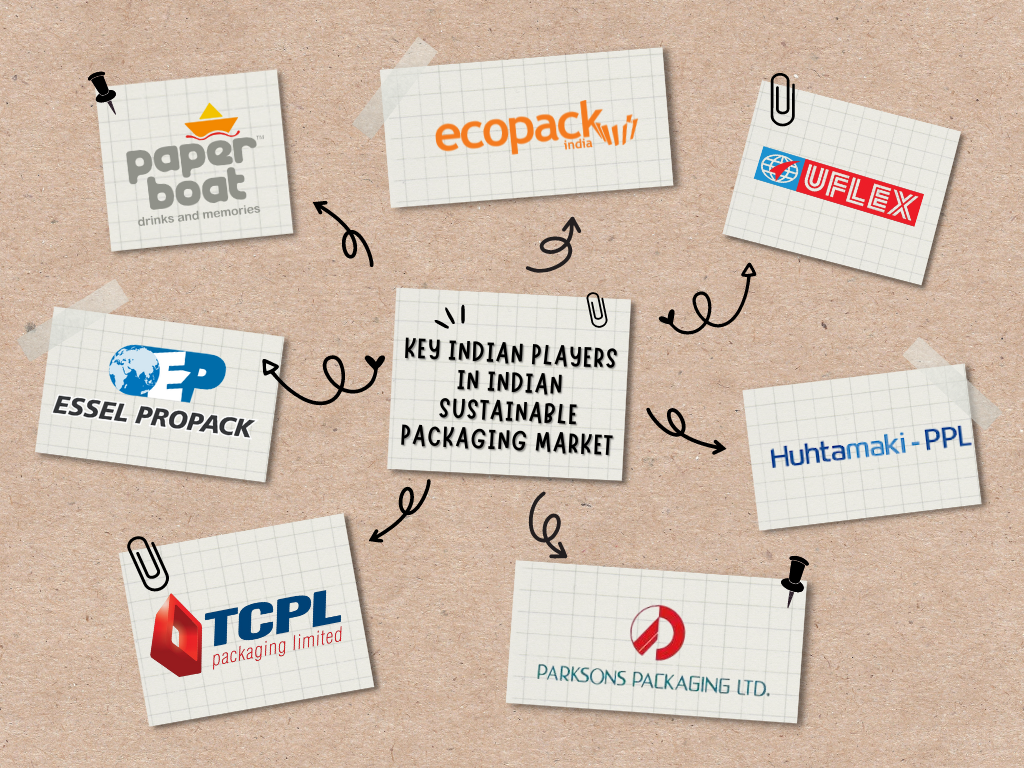
- EcoPack India:
- EcoPack India is a leading manufacturer of sustainable packaging solutions in India.
- The company specializes in eco-friendly packaging materials such as biodegradable bags, compostable packaging, and recycled paper products.
- EcoPack India serves a wide range of industries including food and beverage, retail, and e-commerce.
- Uflex Limited:
- Uflex Limited is one of the largest flexible packaging companies in India.
- The company offers sustainable packaging solutions including biodegradable films, recyclable laminates, and compostable pouches.
- Uflex has a strong focus on research and innovation in sustainable packaging technologies.
- Huhtamaki PPL Limited:
- Huhtamaki PPL Limited is a leading provider of sustainable packaging solutions in India.
- The company offers eco-friendly packaging materials such as paper cups, molded fiber products, and biodegradable food packaging.
- Huhtamaki PPL serves customers in various sectors including foodservice, healthcare, and retail.
- TCPL Packaging Limited:
- TCPL Packaging Limited is a prominent packaging solutions provider in India.
- The company offers sustainable packaging solutions including paper-based packaging, recycled paperboard, and eco-friendly cartons.
- TCPL Packaging serves clients in industries such as pharmaceuticals, FMCG, and consumer electronics.
- Essel Propack Limited:
- Essel Propack Limited is a global leader in laminated tubes and specialty packaging solutions.
- The company offers sustainable packaging solutions including recyclable tubes, bio-based materials, and eco-friendly laminates.
- Essel Propack serves customers in the personal care, oral care, and pharmaceutical industries.
- Parksons Packaging Limited:
- Parksons Packaging Limited is one of the largest packaging companies in India.
- The company specializes in sustainable packaging solutions including corrugated boxes, recycled paperboard packaging, and biodegradable materials.
- Parksons Packaging caters to industries such as food and beverage, consumer goods, and pharmaceuticals.
- Paper Boat Packaging:
- Paper Boat Packaging is a leading provider of sustainable paper-based packaging solutions in India.
- The company offers eco-friendly packaging materials such as paper bags, corrugated boxes, and recycled paper products.
- Paper Boat Packaging serves clients in the retail, e-commerce, and hospitality sectors.
KEY INTERNATIONAL AND GLOBAL PLAYERS IN INDIAN SUSTAINABLE PACKAGING MARKET
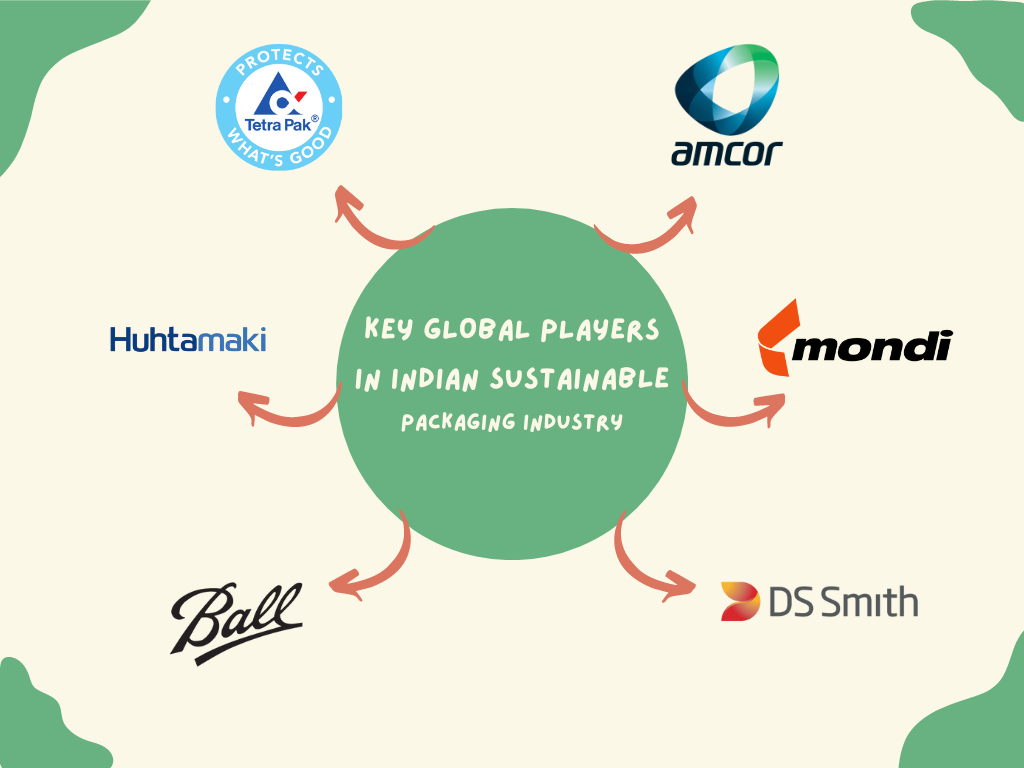
- Tetra Pak: Tetra Pak is a global leader in packaging and processing solutions. In India, Tetra Pak has been actively promoting sustainable packaging solutions, particularly in the food and beverage sector. The company has introduced various initiatives such as Tetra Rex Bio-based, which is made entirely from renewable materials.
- Amcor plc: Amcor is a global packaging manufacturer headquartered in Australia. The company has a significant presence in the Indian market and offers a range of sustainable packaging solutions, including recyclable and compostable packaging options.
- Huhtamaki Group: Huhtamaki is a Finland-based packaging solutions provider with operations worldwide. In India, the company offers a wide range of sustainable packaging solutions, including compostable and biodegradable products.
- Mondi Group: Mondi is an international packaging and paper group headquartered in South Africa. The company has operations in India and offers sustainable packaging solutions, including paper-based products sourced from responsibly managed forests.
- Ball Corporation: Ball Corporation, headquartered in the United States, is a leading supplier of metal packaging solutions. The company has a presence in India and offers sustainable aluminum packaging options, including recyclable and reusable containers.
- DS Smith plc: DS Smith is a leading provider of sustainable packaging solutions based in the United Kingdom. The company has a presence in India and offers a range of recyclable and biodegradable packaging solutions for various industries.
GOVERNMENT POLICIES FOR SUSTAINABLE PACKAGING
| Policy/Rule | Description |
|---|---|
| Plastic Waste Management Rules (PWM), 2016 | Introduced by MoEFCC to reduce plastic waste and promote recycling. Mandates Extended Producer Responsibility (EPR) for producers, importers, and brand owners. |
| Specific targets set for waste collection, segregation, and recycling. States required to achieve a minimum of 25% recycling of plastic waste by 2021. | |
| Plastic Waste Management (Amendment) Rules, 2018 | Amended regulations for plastic packaging, including phasing out non-recyclable multi-layered plastic (MLP) packaging within two years. Promotes use of recyclable alternatives. |
| Single-Use Plastics (SUP) Ban | Various states and union territories in India implemented bans on single-use plastics (e.g., bags, cutlery, straws) to reduce plastic pollution. Maharashtra implemented ban from June 2018. |
| National Packaging Policy (NPP) | Under consideration by the Indian government to address packaging waste issues and promote sustainable packaging practices. Aims to establish standards, promote recycling, and eco-friendly materials. |
| EcoMark Certification Scheme | Implemented by BIS to certify environmentally friendly products, including packaging materials. Products meeting specified criteria for environmental performance and sustainability are eligible. |
KEY CHALLENGES FOR INDIAN SUSTAINABILITY PACKAGING:
Net Zero by Narsi
Insights and interactions on climate action by Narasimhan Santhanam, Director - EAI
View full playlist- Cost Considerations:
- One of the primary challenges is the higher cost associated with sustainable packaging materials compared to conventional packaging materials.
- According to industry reports, sustainable packaging materials can cost up to 20-30% more than traditional materials, which poses a barrier for widespread adoption among cost-conscious businesses.
- Infrastructure Limitations:
- India faces challenges in terms of infrastructure for collection, segregation, and recycling of packaging waste, particularly in rural and semi-urban areas.
- According to a report by the Central Pollution Control Board (CPCB), only about 60% of the plastic waste generated in India is recycled, highlighting gaps in waste management infrastructure.
- Consumer Behavior and Awareness:
- Despite growing awareness about environmental issues, consumer behavior regarding sustainable packaging remains a challenge.
- Studies suggest that while consumers express concern about environmental sustainability, their purchasing decisions are often influenced by factors such as convenience and price rather than eco-friendliness.
- Lack of Regulatory Clarity:
- The absence of clear and uniform regulations for sustainable packaging standards and labeling poses challenges for businesses in ensuring compliance.
- India lacks a comprehensive regulatory framework specifically addressing sustainable packaging, leading to ambiguity and inconsistency in industry practices.
- Supply Chain Complexity:
- Sustainable packaging often involves complex supply chains, especially for materials sourced from renewable or biodegradable sources.
- Ensuring a consistent and reliable supply of sustainable packaging materials can be challenging due to factors such as seasonality, agricultural dependencies, and supply chain disruptions.
KEY INNOVATIONS DRIVING THE INDIAN SUSTAINABILITY PACKAGING MARKET
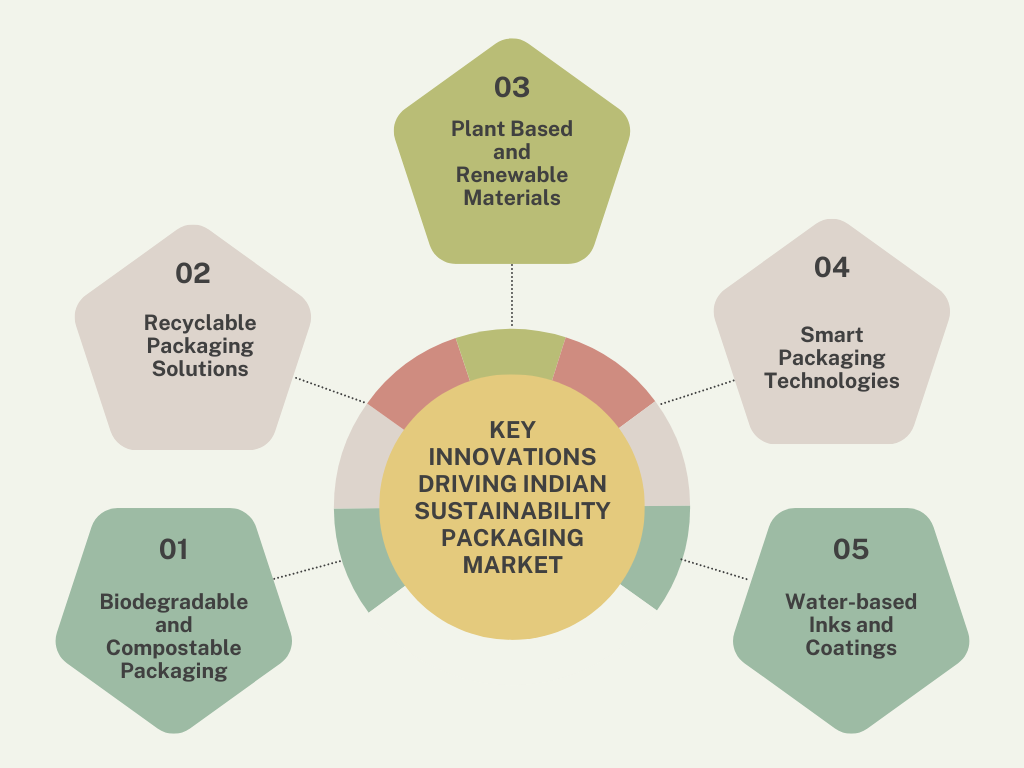
- Biodegradable and Compostable Packaging:
- Innovations in biodegradable and compostable packaging materials offer alternatives to traditional plastic packaging, reducing environmental impact.
- According to a report by the Confederation of Indian Industry (CII), the market for biodegradable plastics in India is expected to grow at a CAGR of over 15% between 2020 and 2025.
- Recyclable Packaging Solutions:
- Innovations in recyclable packaging materials and design enable the creation of packaging that can be easily recycled and reused.
- The Indian government’s emphasis on Extended Producer Responsibility (EPR) under the Plastic Waste Management Rules (PWM), 2016, has spurred innovation in recyclable packaging solutions.
- Plant-Based and Renewable Materials:
- Utilizing plant-based and renewable materials such as bamboo, sugarcane bagasse, and cornstarch for packaging offers sustainable alternatives to conventional materials.
- According to a report by Research and Markets, the Indian market for bioplastics is projected to grow at a CAGR of over 10% between 2021 and 2026.
- Smart Packaging Technologies:
- Innovations in smart packaging technologies, including RFID tags, QR codes, and sensors, enable enhanced product traceability, safety, and shelf life extension.
- Smart packaging solutions contribute to reducing food waste and improving supply chain efficiency.
- Water-Based Inks and Coatings:
- Adoption of water-based inks and coatings for packaging printing reduces the environmental impact associated with solvent-based alternatives.
- Water-based inks offer lower VOC

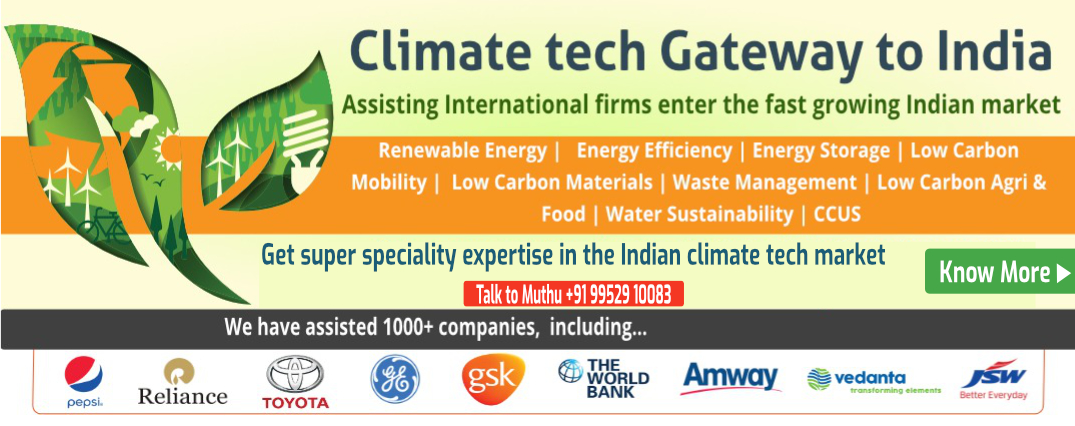



 Our specialty focus areas include
Our specialty focus areas include



